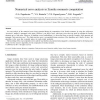Free Online Productivity Tools
i2Speak
i2Symbol
i2OCR
iTex2Img
iWeb2Print
iWeb2Shot
i2Type
iPdf2Split
iPdf2Merge
i2Bopomofo
i2Arabic
i2Style
i2Image
i2PDF
iLatex2Rtf
Sci2ools
IVC
2006
2006
Numerical error analysis in Zernike moments computation
An exact analysis of the numerical errors being generated during the computation of the Zernike moments, by using the well-known `q-recursive' method, is attempted in this paper. Overflow is one kind of error, which may occur when one needs to calculate the Zernike moments up to a high order. Moreover, by applying a novel methodology it is shown that there are specific formulas, which generate and propagate `finite precision error'. This finite precision error is accumulated during execution of the algorithm, and it finally `destroys' the algorithm, in the sense that eventually makes its results totally unreliable. The knowledge of the exact computation errors and the way that they are generated and propagated is a fundamental step for developing more robust error-free recursive algorithms, for the computation of Zernike moments. q 2006 Elsevier B.V. All rights reserved.
Related Content
| Added | 13 Dec 2010 |
| Updated | 13 Dec 2010 |
| Type | Journal |
| Year | 2006 |
| Where | IVC |
| Authors | George A. Papakostas, Yiannis S. Boutalis, Constantin Papaodysseus, Dimitrios K. Fragoulis |
Comments (0)

